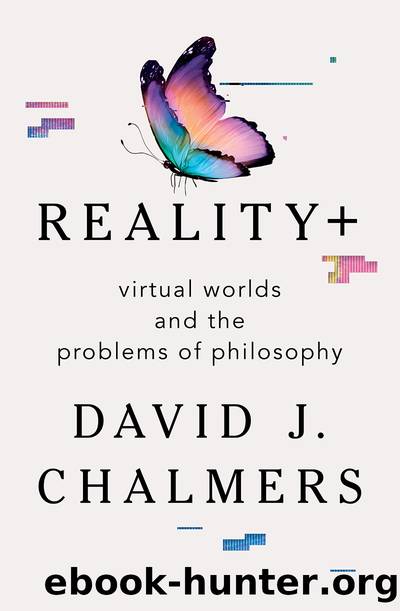Reality+ by David J. Chalmers

Author:David J. Chalmers
Language: eng
Format: epub
Publisher: W. W. Norton & Company
Published: 2021-12-15T00:00:00+00:00
Upshot
The arguments in this chapter can help us think clearly about the simulation hypothesis. We saw in chapter 2 that the hypothesis can be split into the pure simulation hypothesis, in which our cognitive system is part of the simulation, and the impure simulation hypothesis, in which itâs not. The traditional brain-in-a-vat scenario is an impure simulation, as is the situation in The Matrix. In this chapter weâve mainly been focusing on impure simulations, in which the cognitive system and the physics of the virtual world are distinct.
If I accept the impure simulation hypothesis, I should accept the Cartesian dualist hypothesis that my cognitive system is nonphysical and interacting with physical systems. My mind is outside the physical space of my virtual world, and it interacts with my body, which is inside that space. My physical world derives entirely from bits in a computer, but my mind is tied to the brain in a vat, which need not derive from bits at all.
Earlier, I argued that the simulation hypothesis leads to the it-from-bit creation hypothesis. Now we can see that the impure simulation hypothesis leads to the Cartesian it-from-bit creation hypothesis: Physical systems derive from computational processes, put in place by a creator, and our cognitive systems are distinct from, and interact with, these physical systems. In effect, the impure simulation idea is akin to combining the it-from-bit creation idea about the physical world with Cartesian dualism about the mind. By contrast, the pure simulation hypothesis leads to the non-Cartesian it-from-bit creation hypothesis: Our cognitive systems derive from physical systems, which derive from computations, which are themselves created.
Iâm not suggesting that the impure simulation hypothesis is especially plausible. If you take the simulation hypothesis seriously because of the statistical argument (see chapter 5) that simulations will be common, this reasoning tends to support the pure simulation hypothesis. It will be easier to create pure simulations (just set up the simulated physics of a world and watch it go), and much harder to create impure simulations (in which youâll need separate minds to interact with the simulation). If you need a biological brain for every impure simulation, this poses a hurdle that may limit the supply of impure simulations. As long as pure simulations can also support minds like ours (as weâll discuss in the next chapter), statistical reasoning suggests that itâs more probable that weâre in a pure simulation than an impure one.
Furthermore, insofar as we have reasonable evidence that physics forms a closed network in our world, this is evidence against the Cartesian hypothesis and against the impure simulation hypothesis, or at least against versions of these hypotheses in which the mind makes a difference in the physical world.
Still, simulation reasoning may give us reason to take Cartesian dualism more seriously than before. Cartesian dualism initially seems supernaturalâinconsistent with a naturalistic view of the world. Simulation reasoning shows us how Cartesian dualism might be entirely naturalistic, deriving from natural processes in an outer world. Just as simulation reasoning gave us a naturalistic version of theism, it also gives us a naturalistic version of Cartesian dualism.
Download
This site does not store any files on its server. We only index and link to content provided by other sites. Please contact the content providers to delete copyright contents if any and email us, we'll remove relevant links or contents immediately.
| Administration & Medicine Economics | Allied Health Professions |
| Basic Sciences | Dentistry |
| History | Medical Informatics |
| Medicine | Nursing |
| Pharmacology | Psychology |
| Research | Veterinary Medicine |
Machine Learning at Scale with H2O by Gregory Keys | David Whiting(4313)
Fairy Tale by Stephen King(3399)
Will by Will Smith(2920)
Hooked: A Dark, Contemporary Romance (Never After Series) by Emily McIntire(2555)
Rationality by Steven Pinker(2366)
Friends, Lovers, and the Big Terrible Thing by Matthew Perry(2230)
The Becoming by Nora Roberts(2203)
Love on the Brain by Ali Hazelwood(2078)
A Short History of War by Jeremy Black(1848)
HBR's 10 Must Reads 2022 by Harvard Business Review(1845)
The Strength In Our Scars by Bianca Sparacino(1844)
Leviathan Falls (The Expanse Book 9) by James S. A. Corey(1745)
A Game of Thrones (The Illustrated Edition) by George R. R. Martin(1745)
515945210 by Unknown(1667)
Bewilderment by Richard Powers(1621)
443319537 by Unknown(1560)
The 1619 Project by Unknown(1462)
The Real Anthony Fauci: Bill Gates, Big Pharma, and the Global War on Democracy and Public Health (Childrenâs Health Defense) by Robert F. Kennedy(1409)
All About Love: New Visions by bell hooks(1352)
